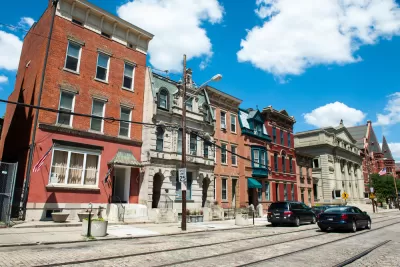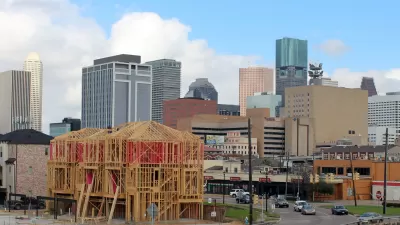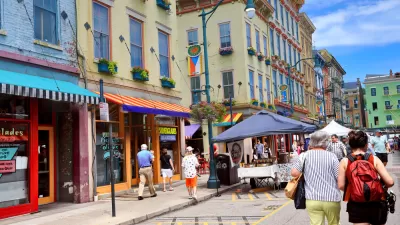While the southern end of the thoroughfare is seeing rapid redevelopment and gentrification, the northern end has yet to reap any benefits from the nearby projects.

Cincinnati's Vine Street is starting to show a stark divide between its gentrifying southern end and the largely ignored section north of Liberty Street, reports Monique John for WCPO Cincinnati. In 2001, the fatal shooting of Timothy Thomas by a Cincinnati police officer sparked days of protests in the neighborhood. "The gentrification that took place on Vine south of Liberty can be explained as an attempt toward social reform triggered by Thomas’s killing." But despite the transformations happening a block away, John writes, "Northern Vine has remained in its distressed state."
Andy Hutzel, director of resident services at Over-the-Rhine Community Housing, contends that the historic nature of the housing stock on Northern Vine plays a role in the slow redevelopment of the area, explaining that "rehabilitating old buildings that dominate OTR comes at a hefty price." Local stakeholders are hopeful that plans to extend revitalization efforts to the north will come to fruition soon, and "experts project that the urban core’s rapid development in recent decades likely will not slow down as it moves into the northern portion of Over-the-Rhine."
Other locals worry about the displacement and higher cost of living that usually come with redevelopment. "Vulnerable residents are hungrier for amenities like laundromats, social spaces, and food establishments that they can afford." To address these concerns, "investing in affordable housing will be key to protecting vulnerable residents like those living on or near northern Vine from the drastic changes to come."
FULL STORY: Will gentrification keep climbing up Over-the-Rhine's Vine Street?

Maui's Vacation Rental Debate Turns Ugly
Verbal attacks, misinformation campaigns and fistfights plague a high-stakes debate to convert thousands of vacation rentals into long-term housing.

Planetizen Federal Action Tracker
A weekly monitor of how Trump’s orders and actions are impacting planners and planning in America.

In Urban Planning, AI Prompting Could be the New Design Thinking
Creativity has long been key to great urban design. What if we see AI as our new creative partner?

King County Supportive Housing Program Offers Hope for Unhoused Residents
The county is taking a ‘Housing First’ approach that prioritizes getting people into housing, then offering wraparound supportive services.

Researchers Use AI to Get Clearer Picture of US Housing
Analysts are using artificial intelligence to supercharge their research by allowing them to comb through data faster. Though these AI tools can be error prone, they save time and housing researchers are optimistic about the future.

Making Shared Micromobility More Inclusive
Cities and shared mobility system operators can do more to include people with disabilities in planning and operations, per a new report.
Urban Design for Planners 1: Software Tools
This six-course series explores essential urban design concepts using open source software and equips planners with the tools they need to participate fully in the urban design process.
Planning for Universal Design
Learn the tools for implementing Universal Design in planning regulations.
planning NEXT
Appalachian Highlands Housing Partners
Mpact (founded as Rail~Volution)
City of Camden Redevelopment Agency
City of Astoria
City of Portland
City of Laramie





























